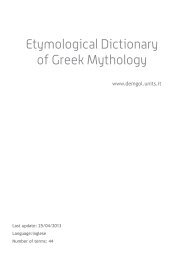Diccionari Etimològic de la Mitologia Grega
Diccionari Etimològic de la Mitologia Grega
Diccionari Etimològic de la Mitologia Grega
You also want an ePaper? Increase the reach of your titles
YUMPU automatically turns print PDFs into web optimized ePapers that Google loves.
<strong>Diccionari</strong> <strong>Etimològic</strong> <strong>de</strong> <strong>la</strong> <strong>Mitologia</strong> <strong>Grega</strong> - www.<strong>de</strong>mgol.units.it<br />
Εὐρώπη<br />
EUROPA<br />
Nom <strong>de</strong> diverses heroïnes, entre les quals <strong>la</strong> més cèlebre és <strong>la</strong> fil<strong>la</strong> d'Agènor i Telefassa, estimada per Zeus metamorfosat<br />
en toro b<strong>la</strong>nc (Hom. Il. 14, 321 sq.).<br />
Segons Chantraine (DELG) l'etimologia és <strong>de</strong>sconeguda; Frisk al contrari (Griech. Et. Wört., p. 593) pensa que es pot<br />
tractar d'un nom prehel·lènic: aquesta hipòtesi, sostinguda també per Sommer ("Indog. Forsch". 55, 1937, p. 185 n.<br />
1), no semb<strong>la</strong> gaire p<strong>la</strong>usible. Berger (P.-W. s. v., VI col. 1287) creu que és un compost <strong>de</strong> εὐρύς, "vast" i <strong>de</strong> ὀπ-,<br />
"ull"; hi ha altres significacions: "que ressona lluny" (ὀπ-, "veu") i "obscur", ja assenya<strong>la</strong><strong>de</strong>s pels antics. També ha estat<br />
re<strong>la</strong>cionat amb el semític (Grimme, "Glotta" 14, 1925, p. 17; cf. <strong>la</strong> síntesi <strong>de</strong>tal<strong>la</strong>da <strong>de</strong> Càsso<strong>la</strong>, Studi Mazzarino, pp.<br />
48-54), o fins i tot amb l'accadi erebu "posta <strong>de</strong> sol", és a dir "terra <strong>de</strong> ponent, <strong>de</strong> l'occi<strong>de</strong>nt". Càsso<strong>la</strong> s'inclina, amb raó,<br />
a reconèixer-hi un compost <strong>de</strong> εὐρύς i -ωψ, "d'ampli esguard". Els grecs <strong>de</strong>vien tenir aquest nom per anàleg d'altres<br />
nombrosos antropònims femenins en -ωπη, <strong>de</strong> manera que <strong>la</strong> significació "<strong>de</strong> cara ample" semb<strong>la</strong> molt probable. Les<br />
hipòtesis que consisteixen a lligar el primer membre <strong>de</strong>l compost amb εὐρώεις, "boirós, humit, fosc", són molt difícils<br />
per a un nom femení.<br />
Categoria: Persones<br />
Ἅδης<br />
HADES<br />
Déu <strong>de</strong>ls Inferns, fill <strong>de</strong> Cronos i Rea, espòs <strong>de</strong> Persèfone (Hesíod. Theog. 311).<br />
Les hipòtesis per a <strong>la</strong> interpretació d'aquest nom són diverses. 1) Era analitzat com a ἀ-ιδ-(α) per P<strong>la</strong>tó (Gorg. 493 b;<br />
Crat. 403 a) amb el significat d'"invisible". 2) A causa <strong>de</strong> l'aspiració es proposa una forma *ἁ-ιδ-, idèntica a l'antic indi<br />
sam-vid-, "trobar-se junts, reunir-se", amb el significat <strong>de</strong> "trobar-se amb el déu en el més enllà". Aquesta interpretació<br />
comporta que calgui consi<strong>de</strong>rar l'α- l<strong>la</strong>rga d'Ἀίδης com a secundària. 3) També s'ha proposat <strong>de</strong> re<strong>la</strong>cionar-lo amb<br />
ἀίσσω, amb el significat <strong>de</strong> "que es l<strong>la</strong>nça veloç, impetuós, potent" (Danielsson, "Indog. Forsch." 14, 1903, pp. 387 ss.).<br />
MYTH. HOM.: Catherine Cousin, La situation géographique et les abords <strong>de</strong> l'Ha<strong>de</strong>s homérique GAIA 6, 2002, pp. 25-46.<br />
Categoria: Déus<br />
Motiu: Rapte<br />
Ἁγνώ<br />
HAGNÓ<br />
Nom d'una nimfa <strong>de</strong> <strong>la</strong> font <strong>de</strong>l mont Liceu, que segons una llegenda arcàdia crià Zeus <strong>de</strong> petit (Pausan. 8, 31, 2; 38,<br />
2 ss.; 47, 3).<br />
Deriva <strong>de</strong> l'adjectiu ἁγνός, "sagrat, pur, cast" i significa "pura".<br />
Categoria: Déus<br />
Ἁλία<br />
HALIA<br />
Nom d'una heroïna <strong>de</strong> Ro<strong>de</strong>s, germana <strong>de</strong>ls Telquins (Diod. Sic. 5, 55) i d'una Nerei<strong>de</strong> (Hesiod. Theog. 245).<br />
44







